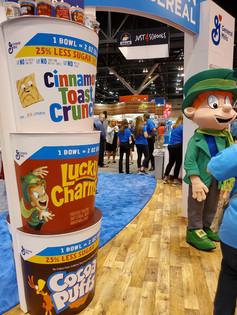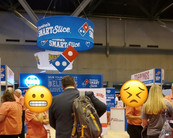I went to a school nutrition conference, and here's what I saw...
- Madeline Bennett

- Jul 29, 2019
- 3 min read
Last week, I spent two days at the School Nutrition Association (SNA) Annual National Conference in St. Louis, Missouri. For our readers who don’t know what SNA is, it is the professional organization of school food service, and it boasts nearly 60,000 members nationally.
The conference itself hosts an exhibition where food service providers, business software and kitchen supply companies, well-known and mom-and-pop food retailers, and a handful of nonprofits are set up in a seemingly endless maze of booths. Integral to the conference experience are dozens of education sessions ranging in topic from staff management to food allergies to labor shortages.
Having never attended, I walked into the conference center with few expectations but was immediately struck by the unabashed corporatism of the event.

The hallway leading to the exhibition was dotted with display cases housing sugary cereals, cinnamon rolls, and other familiar packaged products with name brands. It was a small taste of what was waiting for me in the exhibit hall itself.
To give you a sense of the hall’s vastness, I spent well over three hours meandering through the booths, sampling products, chatting with sales reps, and collecting free trinkets like tote bags and pens. I could see how easy it would be to get swept up in the razzle-dazzle of the raffles, flashy displays, and corporate-sponsored afterparties—not to mention a fair bit of flamboyant schmoozing.

On the whole, the atmosphere was a self-congratulatory celebration of the Standard American Diet, as if Big Food and Ag were throwing their own surprise birthday party.
Though nothing I saw was too obscene, watching food service professionals take photos with people dressed as the Lucky Charms leprechaun and Cheetos cheetah was definitely beyond the pale.
Yes, there were many disheartening sights, like booths dedicated to smoked meats and donuts and pepperoni pizza, but there were the occasional glimmers of hope, too. For example, there was evidence that some companies are embracing the emerging trend of plant-forward menu items.
I was immediately drawn to the Dr. Praeger’s booth, where bites of plant-forward and plant-based proteins were taste tested. I sampled a veggie noodle bowl, dragonfruit, “fried” brown rice with soybeans, mango salad, plantains, and a flavorful bean chili—all from a small handful of well-established vendors. There were other indications that plant proteins are on SNA’s and companies’ radar screens; soy beverages, faux meats, and chickpea snacks found their way into the exhibition.
In this regard, plant-derived entrees and snacks are gaining a bit of ground, but only at the pace and to the extent that large food service providers are comfortable with it.
At the end of the day, companies will make what sells and exploit dietary trends not for the sake of kids’ health, but for the sake of tapping into all niche markets.
Like SNA, these companies boast their “inclusivity” of plant proteins, but I’ve found that term to be little more than progressive whitewashing for marketing purposes. Inclusivity, almost by definition, precludes criticism of existing bad practices with real health-harming outcomes.
However, it’s clear the SNA recognizes the growing need to diversify the proteins on their menus and make adding plant-rich entrees a priority. To it's credit, the conference did offer a powerful educational session on plant-based proteins, led by two exuberant child nutrition professionals from Boston Public Schools and Burlington School District. Together, they expounded why school food teams should care about adding plant-based entrees to their menus and offered practical insights into the menu change and compliance processes. It was certainly refreshing to see well-respected professionals encouraging their colleagues in other districts to lean into the idea of more balanced food environments.
All in all, SNA has a long way to go if it wants to embody its purported values of being brave and promoting evidence-based nutrition. I don’t see the organization indicting and renouncing processed meats or sugary packaged convenience items anytime soon—not when major sponsors of its conference include Jennie-O, Tyson, Domino’s Pizza, General Mills, and ConAgra.
Still, it was evident many of the professionals who attended are deeply committed to the students and communities they serve. I take solace in knowing there are dedicated school nutrition professionals who really care, who fight the good fight, and who do the best they can with the information and resources they have. And at Balanced, we’ll play our part by supporting them in our work everyday.














